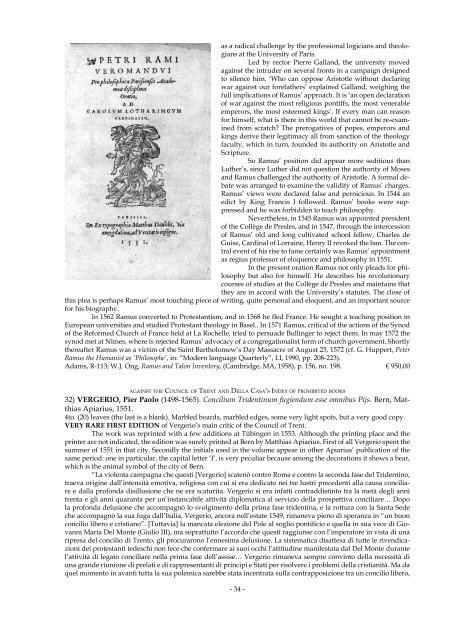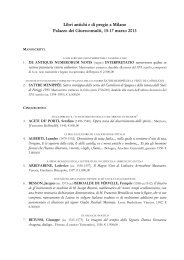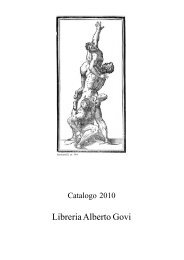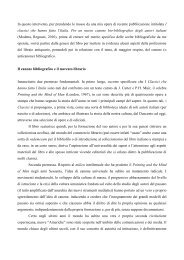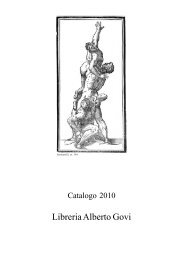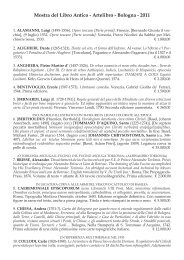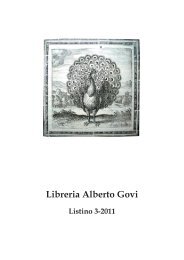as a radical challenge by the professional logicians and theologiansat the University of Paris.Led by rector Pierre Galland, the university movedagainst the intruder on several fronts in a campaign designedto silence him. ‘Who can oppose Aristotle without declaringwar against our forefathers’ explained Galland, weighing thefull implications of Ramus’ approach. It is ‘an open declarationof war against the most religious pontiffs, the most venerableemperors, the most esteemed kings’. If every man can reasonfor himself, what is there in this world that cannot be re-examinedfrom scratch? The prerogatives of popes, emperors andkings derive their legitimacy all from sanction of the theologyfaculty, which in turn, founded its authority on Aristotle andScripture.So Ramus’ position did appear more seditious thanLuther’s, since Luther did not question the authority of Mosesand Ramus challenged the authority of Aristotle. A formal debatewas arranged to examine the validity of Ramus’ charges.Ramus’ views were declared false and pernicious. In 1544 anedict by King Francis I followed. Ramus’ books were suppressedand he was forbidden to teach philosophy.Nevertheless, in 1545 Ramus was appointed presidentof the Collège de Presles, and in 1547, through the intercessionof Ramus’ old and long cultivated school fellow, Charles deGuise, Cardinal of Lorraine, Henry II revoked the ban. The centralevent of his rise to fame certainly was Ramus’ appointmentas regius professor of eloquence and philosophy in 1551.In the present oration Ramus not only pleads for philosophybut also for himself. He describes his revolutionarycourses of studies at the Collège de Presles and maintains thatthey are in accord with the University’s statutes. The close ofthis plea is perhaps Ramus’ most touching piece of writing, quite personal and eloquent, and an important sourcefor his biography.In 1562 Ramus converted to Protestantism, and in 1568 he fled France. He sought a teaching position inEuropean universities and studied Protestant theology in Basel.. In 1571 Ramus, critical of the actions of the Synodof the Reformed Church of France held at La Rochelle, tried to persuade Bullinger to reject them. In may 1572 thesynod met at Nîmes, where is rejected Ramus’ advocacy of a congregationalist form of church government. Shortlythereafter Ramus was a victim of the Saint Bartholomew’s Day Massacre of August 23, 1572 (cf. G. Huppert, PeterRamus the Humanist as ‘Philosophe’, in: “Modern language Quarterly”, LI, 1990, pp. 208-223).Adams, R-113; W.J. Ong, Ramus and Talon Inventory, (Cambridge, MA, 1958), p. 156, no. 198. € 950,00against the Council of Trent and Della Casa’s Index of prohibited books32) VERGERIO, Pier Paolo (1498-1565). Concilium Tridentinum fugiendum esse omnibus Pijs. Bern, MatthiasApiarius, 1551.4to. (20) leaves (the last is a blank). Marbled boards, marbled edges, some very light spots, but a very good copy.VERY RARE FIRST EDITION of Vergerio’s main critic of the Council of Trent.The work was reprinted with a few additions at Tübingen in 1553. Although the printing place and theprinter are not indicated, the edition was surely printed at Bern by Matthias Apiarius. First of all Vergerio spent thesummer of 1551 in that city. Secondly the initials used in the volume appear in other Apiarius’ publication of thesame period: one in particular, the capital letter ‘I’, is very peculiar because among the decorations it shows a bear,which is the animal symbol of the city of Bern.“La violenta campagna che questi [Vergerio] scatenò contro Roma e contro la seconda fase del Tridentino,traeva origine dall’intensità emotiva, religiosa con cui si era dedicato nei tre lustri precedenti alla causa conciliaree dalla profonda disillusione che ne era scaturita. Vergerio si era infatti contraddistinto tra la metà degli annitrenta e gli anni quaranta per un’instancabile attività diplomatica al servizio della prospettiva conciliare… Dopola profonda delusione che accompagnò lo svolgimento della prima fase tridentina, e la rottura con la Santa Sedeche accompagnò la sua fuga dall’Italia, Vergerio, ancora nell’estate 1549, rimaneva pieno di speranza in “un buonconcilio libero e cristiano”. [Tuttavia] la mancata elezione del Pole al soglio pontificio e quella in sua vece di GiovanniMaria Del Monte (Giulio III), ma soprattutto l’accordo che questi raggiunse con l’imperatore in vista di unaripresa del concilio di Trento, gli procurarono l’ennesima delusione. La sistematica disattesa di tutte le rivendicazionidei protestanti tedeschi non fece che confermare ai suoi occhi l’attitudine manifestata dal Del Monte durantel’attività di legato conciliare nella prima fase dell’assise… Vergerio rimaneva sempre convinto della necessità diuna grande riunione di prelati e di rappresentanti di principi e Stati per risolvere i problemi della cristianità. Ma daquel momento in avanti tutta la sua polemica sarebbe stata incentrata sulla contrapposizione tra un concilio libero,- 34 -
quale quello che lui auspicava, e la riunione convocata nel maggio 1551 dal pontefice… Quando la convocazioneera stata ufficializzata con la Bulla reductionis di Giulio III (emanata il 14 novembre 1550), Vergerio aveva tentatodi convincere il maggior numero possibile di vescovi a seguire l’esempio dei vescovi francesi, disertando l’assise.Pubblicò una contraffazione parodistica della bolla di convocazione del concilio, ristampando il documento conun commento attribuito al giurista di Capodistria Ottonello Vida. In primavera, poi, verosimilmente prima delladata fissata per la prima seduta (1 maggio), diede alle stampe una raccolta di documenti in latino riguardanti lapreparazione del concilio, Concilium Tridentinum fugiendum esse omnibus piis, pieno di testimonianze relative altrattamento riservato ai dissenzienti dai precedenti concili ecclesiastici, a cominciare dalla sorte capitata a JohannHus al concilio di Costanza: un ammonimento, dunque, rivolto a chi stava per riporre il proprio destino nelle manidel papa, affidandosi fiducioso al salvacondotto imperiale. Secondo l’accordo fra Carlo V e Giulio III, infatti, questavolta, su precisa indicazione dell’imperatore, principi e città protestanti avrebbero dovuto partecipare: il Brandeburgo,il Württemberg, la Sassonia, Strasburgo avevano già designato i loro rappresentanti ottenendo il relativosalvacondotto imperiale. A loro si rivolgeva Vergerio… Vergerio in questo testo pubblicava documenti recentissimie ancora ricoperti dal vincolo di segretezza, dei quali era giunto in possesso probabilmente attraverso qualche fonted’informazione interna al concilio” (G. Caravale, La polemica protestante contro il Tridentino, in: “L’uomo del Concilio.Il cardinale Giovanni Morone tra Roma e Trento nell’età di Michelangelo”, R. Pancheri & D. Primerano, eds, Trent,2009, pp. 53-55 and 62).“Colui che seguiva il Concilio con la massima attenzione in tutte le sue fasi era Vergerio, ex-vescovo elegato papale. Egli ne sconsigliava la partecipazione ed inveiva senza ritegno contro il Papa e i prelati del Concilio.A questa sua avversione egli dava sfogo con espressioni di rabbia in numerose epistole e stampati mordaci. Unadelle sue più note epistole è intitolata Concilium Tridentinum fugiendum esse omnibus piis, che contiene diversidocumenti ed un poco lusinghiero commiato all’indirizzo del Papa: ‘Ti giudichiamo per la tua bocca. I tuoi pensierici sono ormai noti. Festeggia pure le tue radunanze ecclesiastiche a tuo piacimento. Noi rimarremo a casa ad annichilirei tuoi empi editti con la spada della parola divina. Per l’amore di Dio, Padre Eterno, e di Suo Figlio GesùCristo, la tua potenza e la tua persona verranno soppresse’ ” (E. Camenisch, Storia della Riforma e Controriforma nellevalli meridionali del Canton Grigioni, Samedan, 1950, p. 89).The work consists of several parts. The first contains a copy of the papal bull of convocation of the councilaccompanied by the commentary, printed alongside in italics, by the same Vergerio. Then are two letters of EmperorCharles V, also commented by Vergerio, regarding the participation in the Council of representatives of protestantfaith: both are dated Augsburg, March 23, 1551. After two excerpts from the Liber Rituum ecclesiasticorum ofLeo X and the Formula iuramenti of the bishops, Vergerio reports a text that states that the imperial safe-conductdoes not prevent those who carry it from being judged for heresy by the Roman authorities. In this regard, followsa letter of Poggio Bracciolini to Leonardo Aretino about the terrible death of Jan Hus at the Council of Constancein 1415. The book finally closes with the catalog, prepared by the papal legate Giovanni della Casa in 1549, of theheretics whose works are to be condemned and prohibited (in the list appear the names of Luther, Melanchthon,Bucer, Oecolampadius, Zwingli, Calvin, Ochino, Hutten, Peter Martyr, Dolet, Marot, Bibliander, Farel, Viret, etc.),and with two excerpts from a work by Girolamo Muzio against the Germanic nation.Pier Paolo Vergerio was born in Capodistria, a few miles south of Trieste on the Istrian peninsula, whichthen was subject to the republic of Venice. Hed was the son of a local notable and the descendant of the renownedhumanist Pier Paolo Vergerio the Elder. He obtained a solid education in his hometown before enrolling at the Uni-- 35 -
- Page 1 and 2: Catalogue 2013Libreria Alberto Govi
- Page 3 and 4: Catalogue 2013Libreria Alberto Govi
- Page 5 and 6: an hitherto unknown philosophical m
- Page 7 and 8: ustica Lib. X., edited by Giorgio M
- Page 9 and 10: the end is furthermore printed the
- Page 11 and 12: without typographical data, but pro
- Page 13 and 14: Letteratura Italiana”, CXL, 1963,
- Page 15 and 16: as secondary only.The present two e
- Page 17 and 18: position as secretary at the court
- Page 19 and 20: From 1528 he was rector of the newl
- Page 21 and 22: famous personage was in high favor
- Page 23 and 24: Luigi Alamanni and Antonio Brucioli
- Page 25 and 26: In Pincio’s biography of Bernardo
- Page 27 and 28: Tempio della Fama; e così ne trass
- Page 29 and 30: power, and yet to make it possible
- Page 31 and 32: lini, Andrea Alciati, Lilio Gregori
- Page 33: phy in particular, was presented as
- Page 37 and 38: After the flight of the Medici from
- Page 39 and 40: to learn from their own experience
- Page 41 and 42: with some manuscript compositions p
- Page 43 and 44: death sentence issued against him o
- Page 45 and 46: the key work to Della Casa’s thou
- Page 47 and 48: important ones along with those of
- Page 49 and 50: a heavily annotated copy44) HORATIU
- Page 51 and 52: solitudine (1545), but undoubtedly
- Page 53 and 54: provide less description of patholo
- Page 55 and 56: the most up-to-date scientific ency
- Page 57 and 58: (pp. 4-10) written by the author hi
- Page 59 and 60: successivi alla consapevolezza che
- Page 61 and 62: night [February 22]. Rarely does a
- Page 63 and 64: subjects, including Saint-Gelais’
- Page 65 and 66: Catherine de’ Medici, succeeded o
- Page 67 and 68: losofico ed allegorico delle Metamo
- Page 69 and 70: The act concerning primogeniture is
- Page 71 and 72: are not many in number but who are
- Page 73 and 74: the Camilletta, his first work, Gut
- Page 75 and 76: selig, sich nit allein zu kunst geg
- Page 77 and 78: dle, or low. There are, however, pr
- Page 79 and 80: nity: ‘mercenaries should be done
- Page 81 and 82: colò Sfondrati), to whom the Causa
- Page 83 and 84: close of Semiramis’ career. Ninus
- Page 85 and 86:
e contenuti matematici in Henri de
- Page 87 and 88:
The first Hungarian dictionary - Cr
- Page 89 and 90:
& T. Kovács, Deutschlernen in den
- Page 91 and 92:
chitectura’ des Wenzel Dietterlin
- Page 93 and 94:
neo-Latin anthology devoted exclusi
- Page 95 and 96:
as De la puissance ecclésiastique
- Page 97 and 98:
colazione was not eaten first thing
- Page 99 and 100:
advanced both the technical and the
- Page 101 and 102:
di Giorgio Zorzi, ambasciatore in O
- Page 103 and 104:
the Misnah100) MISNAYOT MESUDAR NAS
- Page 105 and 106:
the task of taking part to the nego
- Page 107 and 108:
This is the only iconological work
- Page 109 and 110:
on that occasion, were described an
- Page 111 and 112:
millo Camilliani, Francesco’s son
- Page 113 and 114:
Blanchard, Correggio and Mignard, R
- Page 115 and 116:
di Cicerone d’ottime antiche stam
- Page 117 and 118:
Pietro Aretino125) MAZZUCHELLI, Gio
- Page 119 and 120:
music129) TESTORI, Carlo Giovanni (
- Page 121 and 122:
Vol. VIII (1773): pp. (6), 854 with
- Page 123 and 124:
Di Felice e Gregorio Fontana, 1905,
- Page 125 and 126:
Cicognara, no. 190 (“Nelle quattr
- Page 127 and 128:
mo: fonti, theorie, modelli, 1750-1
- Page 129 and 130:
commentary on the treaty on shabbat
- Page 131 and 132:
poet laureate of Austria, and he le
- Page 133 and 134:
geo-political situation of the regi
- Page 135 and 136:
ope collecting views and pictures o
- Page 137 and 138:
inc.), 100 numbered engraved plates
- Page 139 and 140:
a gift from Emperor Napoléon III t
- Page 141 and 142:
Ardène, no. 123Caprara, no. 103 Tr
- Page 143 and 144:
Speckle, no. 73 Besson, no. 60- 143


